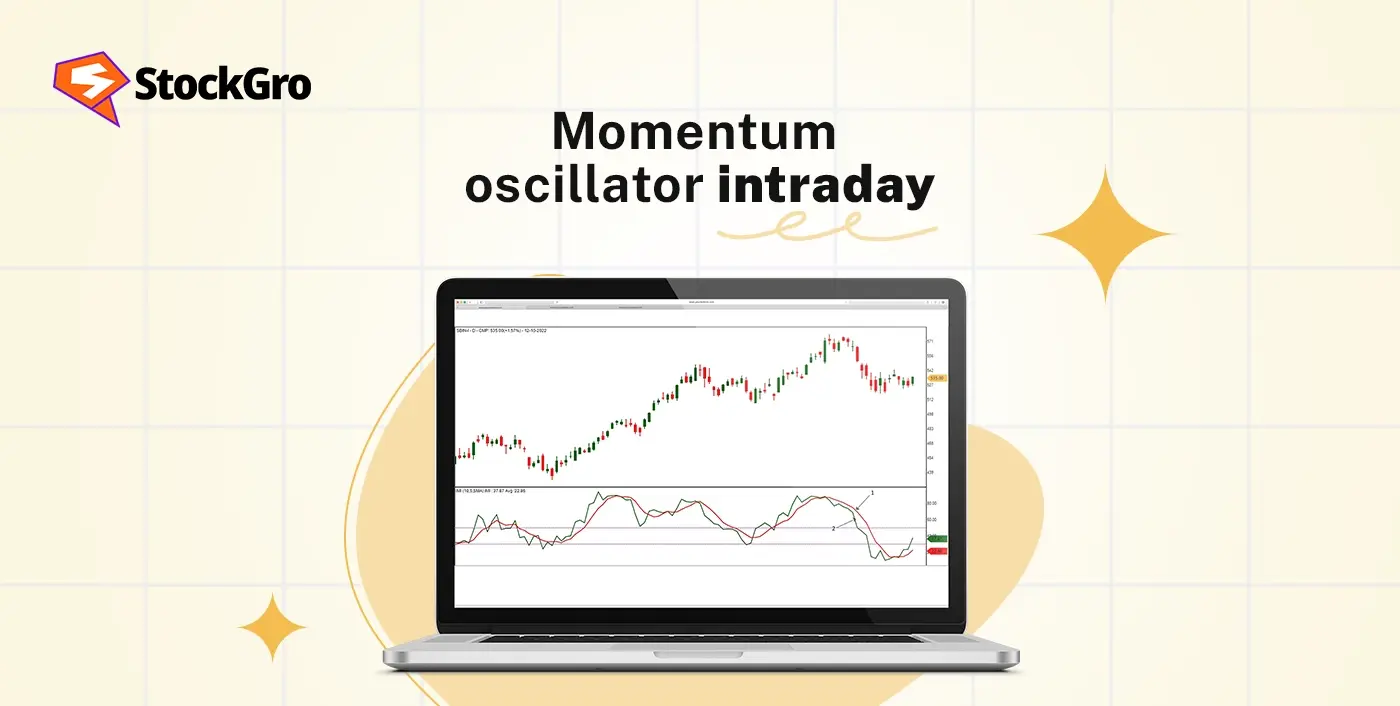
More than 90% of individuals trading derivatives, particularly index options, end up on the losing side. That stark figure shows how intraday trading can slide into gambling if you skip the basics. Hence, is intraday trading gambling? The line between this is thin and knowing where it lies can keep your next trade from becoming just another bet.
What is Intraday Trading?
It involves buying and offloading shares within a single trading session. A trader initiates and concludes all transactions before the market shuts. No position is kept overnight.
Many favour this approach to keep capital fluid rather than locked in. It calls for swift judgment and unwavering focus on price movements. Unlike traditional investing, Intraday trading does not rely on gradual wealth building over years. Instead, the goal is to capture modest price fluctuations during the day.
Why Do People Think Intraday Trading is Gambling?
Many link day trading with gambling since both hinge on outcomes that no one can guarantee. Trades happen in tight timeframes, sometimes even minutes, which makes it feel like placing rapid bets. Sudden market moves add to this casino-like vibe. Hence to an outsider, this can look like a game of chance.
Is Intraday Trading Really Like Gambling?
Gambling runs on luck. You place a bet and hope the odds swing your way. Once that bet is down, there’s no real way to change the outcome. Many enjoy the thrill but accept they have little control.
Day trading looks risky too, yet it works differently. Traders dissect market patterns, interpret economic shifts and rely on charts to predict entries and exits. Sensible risk controls & planning add a layer of control that gaming lacks entirely.
Intraday Trading vs Gambling: Key Differences
| Aspect | Day trading | Gambling |
| How decisions are made | Runs on research and clear signals. Traders adjust when markets shift. | Mostly hinges on luck. Once a bet is placed, the outcome stays out of your hands. |
| Handling risk | Uses stop-losses and position sizing to keep losses in check. | Rarely any structured way to limit losses once the game begins. |
| Finding an edge | Looks for repeatable patterns and trends. Discipline builds a slight advantage over time. | The house edge stays. Big wins happen, but the odds favour the host in the long run. |
| Rules and oversight | Subject to detailed financial rules focused on transparency and fair practice | Regulated mainly to ensure fair play, responsible conduct, and to protect vulnerable individuals |
| Emotional control | Requires steady temperament and adherence to plans under fluctuating market conditions | Emotion often runs the show. The thrill keeps players at the table long after reason fades. |
| Long-term aim | Built for steady results. Skill and strategy matter more as experience grows. | Mostly for fun. Gains are rare, and repeat wins are hard to sustain. |
How Risky is Intraday Trading?
Day trading exposes participants to financial swings that few fully grasp at the outset. The reality is that losses are far more common than consistent wins for most individuals trying to trade.
Consider a few insights that reveal the scale of this risk in FY 2022-23:
- Roughly seven in ten individuals trading shares within the same day closed the year in negative territory
- Young traders under 30 see higher loss rates than older participants.
- Traders making more than 500 trades a year saw their odds of loss rise further.
- Many who lost money also watched extra charges and transaction costs deepen the damage
These numbers show that without clear strategies & strong risk control frequent trading can erode funds rather than build them.
How to Avoid Treating Intraday Trading Like Gambling
Preventing day trading from drifting into pure speculation demands steady focus and sound preparation. The excitement can mirror gambling, but lasting results rely on structured habits rather than chance.
A few practices help separate skill from chance:
- Control emotion when markets move sharply so decisions stay clear
- Base each trade on proper research and tested methods rather than gut feeling
- Set limits on risk and stick to them, even when tempted to recover losses quickly
- Never treat trades like a bet that must win back what was lost
Tips to Make Intraday Trading Safer
Keeping daily trading secure is never about luck alone. It requires a clear plan to handle sudden swings without draining capital unnecessarily.
Here are few intraday trading tips that can help a trader through unpredictable sessions:
- Place stop-loss orders to exit automatically if prices fall beyond an acceptable range
- Set firm take-profit points so earned gains are locked before unexpected reversals erase them
- Manage position size so no single decision places too much of your portfolio at stake
- Maintain a sensible risk-to-return balance to help ensure even modest wins outpace potential setbacks
- Identify key price zones such as support and resistance to choose entries and exits with greater clarity
Common Mistakes That Make Intraday Trading Riskier
Plenty of traders slip into habits that quietly add risk without them noticing. One small lapse can snowball if you let it.
- Chasing momentum without verifying real signals can result in buying too high or exiting too soon
- Holding onto underperforming positions out of hope alone ties up funds better used elsewhere
- Sticking rigidly to one method when market behaviour shifts can leave trades misaligned with new trends
- Overlooking timely economic updates removes context that helps handle unexpected volatility
- Neglecting thorough preparation each morning reduces the chance of spotting genuine opportunities ahead of the crowd
Is Intraday Trading Legal or Gambling in India?
Day trading remains fully recognised under Indian law and must operate within standards set by SEBI. Each position opens and closes within the same session, while defined margin rules and oversight help limit sudden exposure and protect all participants. Any gains or setbacks from such activity fall under speculative business income for tax purposes.
When Does Intraday Trading Become Gambling?
Intraday activity can drift dangerously close to gambling when sound judgement gives way to unchecked behaviour. Risk alone does not transform trading into pure chance, what matters is how that exposure is managed each day.
- Placing larger positions to recover repeated losses without verifying facts first
- Staying glued to market screens for long stretches while other parts of life lose priority
- Using market moves as a way to escape daily pressures rather than make informed decisions
- Finding it difficult to pause even when trades show clear warning signs
- Relying on instinct alone while ignoring checks that once guided each step
When these habits become routine, the gap between a skill-based practice and a blind gamble narrows fast. Noticing this drift early keeps trading rooted in strategy rather than leaving it at the mercy of chance.
Should Beginners Do Intraday Trading?
For those just stepping in, intraday trading as a beginner demands more than a quick glance at share prices. Unlike holding investments for months or years, this approach calls for quick thinking and tight oversight when prices swing.
One careless decision can easily damage a handful of small gains if risk management are missing. Relying on hunches rather than proven signals often leads new traders to take risks they do not fully grasp.
Start with small stakes and treat each session as practice in restraint. Learn to read market patterns, place exit points and use basic limits to manage downside. Building these habits early keeps intraday trading into a method, not a guesswork.
Pros and Cons of Intraday Trading
Pros
- Closing out by day’s end keeps overnight surprises off the table
- Intraday moves can open the door to opportunities on both rising and falling trends in a single day
- The focus stays on price action and technical cues rather than lengthy fundamental research
Cons
- Consistent gains remain uncertain and setbacks can grow quickly if strategies slip
- Staying calm under pressure calls for steady nerves and a clear routine
- Recognising genuine signals and setting exits properly calls for practice and a sharp eye for detail
- Ignoring broader shifts can leave traders exposed when sudden turns in sentiment catch them off guard
Related Concepts: Speculation vs Gambling
Speculation remains distinct when it relies on thoughtful judgement and measured risk. Unlike blind bets, it leans on research and an understanding of possible outcomes, not sheer luck.
A speculator accepts volatility yet expects that method and timing can tilt the balance toward reward. This mindset depends on preparation and the resolve to act only when signals align with the intended objective.
When that structure slips and each move hangs on hope alone, speculation loses its substance. The difference lies in intent and method, not just the risk itself.
Bottomline
The answer for “is Intraday trading gambling?”depends on prudence and structure. Keep discipline intact and the gap between informed trading and blind gambling stays firmly in view.
FAQs
It operates under regulatory oversight in India. SEBI monitors activity and sets clear rules for participation. Margin norms and compliance checks are in place. Traders must report income as speculative under tax laws. The activity stays within a structured financial environment.
Acting without due diligence often resembles blind betting. For instance, placing money on a stock simply because it surged the previous day, with no data to back the move, reflects chance-based action. On the other hand, entering a position after studying earnings reports and price trends shifts the approach towards calculated risk. The tool is the same but how one uses it makes the distinction.
First-time participants may find the trading pace relentless. It calls for swift decisions under pressure with little room for hesitation. Minor errors can lead to outsized consequences. Without a structured approach, it may feel overwhelming. It’s better to first watch how the market works. Learn the basics, practice with small amounts and avoid rushing into trades. Without a clear plan, trading can feel more like guessing than investing.
Not everything depends on chance. Traders often rely on price charts and market data to guide each move. Some still act on impulse, especially under pressure. That’s when risk increases sharply. Luck might affect a single outcome. Over time, skill and discipline decide the direction. Without preparation, outcomes feel random. With structure, results follow a method.
Both carry risks, though the pace and pressure differ. Long-term decisions allow time to recover from dips. Day trades need quick judgment and tighter control. One mistake can undo several gains. Holding for years may reduce emotional swings. Short windows demand sharper focus and stricter limits. Choice depends on comfort with uncertainty and access to time, tools and information.

